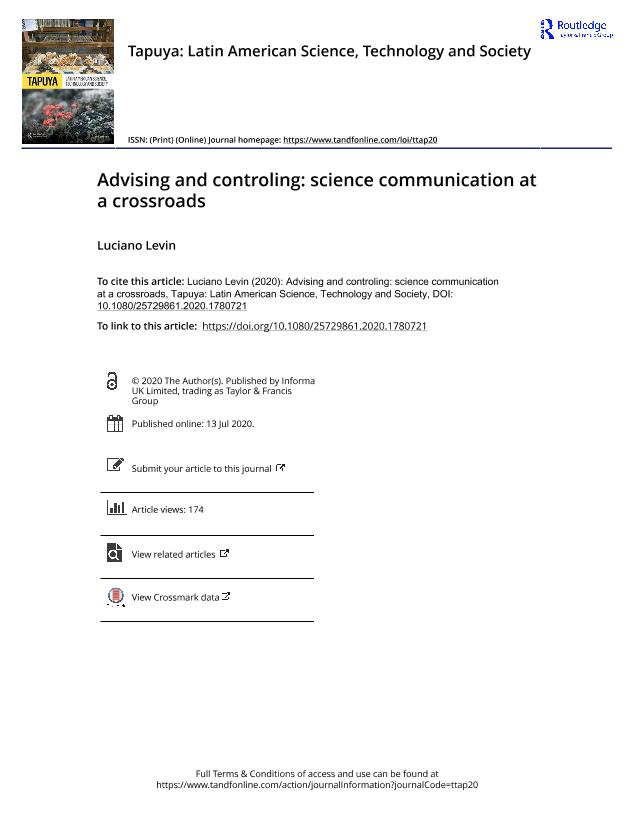Mostrar el registro sencillo del ítem
dc.contributor.author
Levin, Luciano Guillermo

dc.date.available
2021-02-26T19:03:44Z
dc.date.issued
2020-07
dc.identifier.citation
Levin, Luciano Guillermo; Advising and controling: science communication at a crossroads; Routledge; Tapuya: Latin American Science, Technology and Society; 3; 1; 7-2020; 283-285
dc.identifier.uri
http://hdl.handle.net/11336/126858
dc.description.abstract
Pierre Bourdieu wrote that Sociology is “a disturbing science” [une science qui derange] (Bourdieu 1984), because somehow we are all, or believe ourselves to be, sociologists a little bit. Social scientists are used to this situation and nobody complains when citizens talk about globalization or capitalism without too much conceptual knowledge. But also no one is scandalized, for the same reason, if a biologist, biochemist or nuclear physicist talks about these things in the same way. Things are quite different with natural sciences, which have built their languages around representations and numbers (Baird and Hacking 1988). Due to the lack of personal experiences and expertise, very few people can comment on issues such as the atomic structure or the half-life of viruses in a face mask. This produces a double effect: admiration or rejection of natural sciences. Associated with the above, there are overlaps between disciplines and levels of specialization, gray areas in which, for example, a biologist, who studies camelids, can comment on the coronavirus (Airhart 2020; Wrapp et al. 2020) with greater public acceptance than a historian specialized in public health (Cueto 2020). However, the multidimensional crisis unleashed by the coronavirus increased the tensions between knowledge(s) and common sense, and as a consequence several social mechanisms have started. The most visible is infodemic, a term coined in the World Health Organization to denounce a practice that consists of spreading false news about the pandemic increasing panic in societies
dc.format
application/pdf
dc.language.iso
eng
dc.publisher
Routledge

dc.rights
info:eu-repo/semantics/openAccess
dc.rights.uri
https://creativecommons.org/licenses/by/2.5/ar/
dc.subject
Comunicación de la ciencia
dc.subject
Sociología de la ciencia
dc.subject
Fake News
dc.subject.classification
Tópicos Sociales

dc.subject.classification
Sociología

dc.subject.classification
CIENCIAS SOCIALES

dc.title
Advising and controling: science communication at a crossroads
dc.type
info:eu-repo/semantics/article
dc.type
info:ar-repo/semantics/artículo
dc.type
info:eu-repo/semantics/publishedVersion
dc.date.updated
2021-02-24T12:04:43Z
dc.identifier.eissn
2572-9861
dc.journal.volume
3
dc.journal.number
1
dc.journal.pagination
283-285
dc.journal.pais
Reino Unido

dc.journal.ciudad
Londres
dc.description.fil
Fil: Levin, Luciano Guillermo. Universidad Nacional de Río Negro. Sede Andina. Centro de Estudios en Ciencia, Tecnología, Cultura y Desarrollo; Argentina. Consejo Nacional de Investigaciones Científicas y Técnicas. Centro Científico Tecnológico Conicet - Patagonia Norte; Argentina
dc.journal.title
Tapuya: Latin American Science, Technology and Society
dc.relation.alternativeid
info:eu-repo/semantics/altIdentifier/url/https://www.tandfonline.com/doi/full/10.1080/25729861.2020.1780721
dc.relation.alternativeid
info:eu-repo/semantics/altIdentifier/doi/http://dx.doi.org/10.1080/25729861.2020.1780721
Archivos asociados
